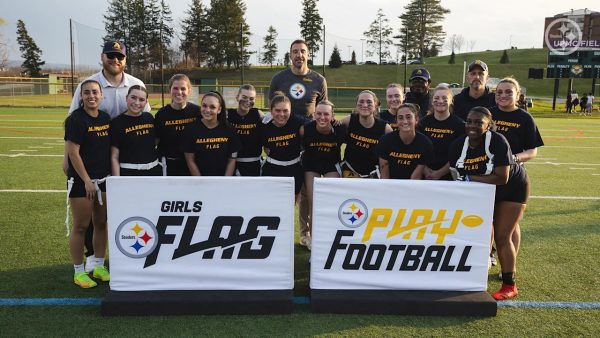Alumnus and Statewide Political Director reflects on Biden victory
The results are now in, and Former Vice President Joe Biden is expected to defeat incumbent Donald Trump in the Presidential Election. Despite a refusal from the sitting President to concede the Election, as results remain pending in Georgia and North Carolina, Biden has secured more electoral and popular votes, and top election officials in states say there has been no sign of fraud or other inconsistencies.
On Monday, Nov. 9, alumnus and Pennsylvania Political Director for the Joe Biden Campaign, Larry Hailsham Jr.,’15, was invited for a reflective conversation hosted by Brian Harward, Robert G. Seddig chair in political science.
While voters awaited the results after Election Day, the Law & Policy Program hosted an informal town hall on Nov. 4, on what the results and paths to victory looked like thus far. The initial discussion with Hailsham was also postponed because he was busy with the pending election results.
Monday’s discussion began via Google Meet, with about 30 participants that included students, faculty and even President Hilary Link.
Harward posed some questions to Hailsham, which consisted of questions submitted beforehand and regarded what the job was like, particularly in terms of Pennsylvania politics, and how Allegheny prepared him for his work. Participants also posed questions in the chat, which pointed to Hailsham’s lessons learned, connections made and hopes for the future.
“What was it like to win?” Hailsham responded to a question. “It was surreal! Election Day plopped upon us. We thought it would be called that evening. It was not. We knew probably around Friday where we were, but not in a couple different places … It felt really good on 11:30 a.m. Saturday to see all the things we had done in Pennsylvania tipped us over.”
Harward was curious as to what Hailsham’s team dynamic was like, and what key strategic decisions they made to win the commonwealth.
“The PA political team was a five-person team,” Hailsham said, “primarily responsible for all the elected and party official relationships in 67 counties … The plan was to turnout base in Philly, turnout base among college-educated (voters), limit losses among non-college educated (voters) and vote by mail.”
COVID-19 proved difficult at first for the team, but Hailsham added Pennsylvania was one of the few states to allow in-person campaigning, and the team strategized a hybrid of outreach ideas, like attending statewide roundtables, discussions and events.
“In signaling to the commonwealth was to have all four of our principles in PA the day before the election,” Hailsham said. “Coronavirus presented a very difficult task for us. Normally we held huge rallies, multiple discussions and now not very much is possible … How do you connect with folks?”
Hailsham noted that the week before Election Day, Senator Kamala Harris and Jill Biden made efforts to gain votes throughout the commonwealth.
In both Lehigh and Northampton Counties, Senator Harris did a Latinx turnout event. In Philadelphia, the campaign participated in a walk-the-block mobilizing event with Black Leaders, namely Congressman Dwight Evans and Cherelle Parker, and in Erie County, Dr. Biden participated in a conversation on the Community College. In all four counties, Biden won.
“Those decisions helped to turn out the base in those areas,” Hailsham said. “Erie again, a stop in Beaver County and Allegheny (County) … a whistle stop tour that hit counties we knew we were going to lose, like Johnstown, PA … The decision to show up and plead the case for the ticket, to let folks know that they aren’t forgotten, that helped push us forward.”
The role of polling data consumed a lot of discussion during last week’s forum, but Hailsham noted that listening to locals can add important campaign data that polls may not have accounted for.
“Polls are important but they don’t dictate everything,” Hailsham said. “They’re guide posts, but making sure we double check with elected stakeholders. (Senator) Casey’s Twitter, he knows PA and knows how to win, his advice has helped us out a tremendous amount. Southeast and West (Pennsylvania) issues that are spoken to, are completely different. Geographically and demographically, people are different.”
As the team leader, Hailsham noted the importance of maintaining relationships with local leaders and engaging them in the Biden Campaign. And while the team mostly coordinated with elected officials, Hailsham noted that progressive unions, like Service Employees International Union, did a lot to elevate and highlight the voters’ stories in the commonwealth.
Pennsylvania United, a Western Pennsylvaniabased organization, made a lot of local election efforts in Erie and Crawford Counties and fights for the issues of a multi-racial working class. Hailsham noted their partnership, along with other partisan and nonpartisan groups, as crucial functions to assure the campaign limited their losses.
“It’s impossible to quantify the impact that folks had,” Hailsham said. “Labor played a part in knocking doors in Erie and Westmoreland (Counties). Everybody comes out and is willing to help in any way they can. Someone in Warren (County) placed yard signs across the state … a County Commissioner working with the Rural Caucus of the (Pennsylvania) Democratic Party, making sure resources were spent well … The (Pittsburgh) Steelers alumni network, Ryan Shazier didn’t vote in 2016, but we had an ad made because he reached out and said ‘how can I help?’ There were even individuals and groups buying food for Election Day work.”
Alexander Yarkosky, ’21, asked Hailsham what work his team did to coordinate with down ballot candidates across the commonwealth.
“I tried to incorporate down ballot candidates in all that we did,” Hailsham said. “We ran a coordinated effort. Incorporated in all walk sheets, scripts. Our hope was that we would have gained four seats in the Senate, and nine seats in the House to have a majority. That did not happen, but I think that that is still possible. There’s a huge gubernatorial race, which is an important determinant on how those seats go.”
Austin Reardon, ’23 was curious as to what Hailsham learned about the nation and the people while campaigning in turbulent times.
“Nina Ahmed is the first woman of color nominated by the party, but did not succeed,” Reardon said. “In 2016, Hillary Clinton was not successful. Katie McGinty, not a win. In so many ways, it’s very much important, but there’s still a lot of work to be done … Those forgotten by the political system found something in Biden. That makes (Pennsylvania) so different. Regardless, every election cycle, it’s so different.”
As a Gator, Hailsham interned in Washington D.C, worked in the Office of Presidential Correspondence and was elected president of Allegheny Student Government, and said it was the Allegheny community and network that had a lot to do with how he ended up in national politics.
“Ultimately, that led me to the job on (Senator) Casey’s Campaign,” Hailsham said, “which ultimately led into learning how policy works in the Chamber, which opened another door for the national campaign … I’ve been very deliberate about everything that I’ve done. I knew the path that I wanted to take. Sometimes it’s a circuitous route you need to take. I didn’t envision all of those things as a means to get somewhere else, I was recruited to do the (Biden) campaign. There were several opportunities I’ve not taken and that’s an important thing to realize later in your career. Early on you take everything, which helped me develop a network of people. I try to be a little bit more kind to myself in recent years around how deliberate and steadfast I need to be to get to where I want to go … I don’t think that serendipity doesn’t come without some intentionalities at the beginning.”
After graduation, Hailsham served as a special assistant to the U.S. Senate in PA, and then secured a position as Western Coordinator for Senator Bob Casey. From there, Hailsham managed the government affairs for the Greater Pittsburgh Chamber of Commerce before taking the position with the Biden team.
When Harward asked what kind of skills, judgement and disposition makes someone in Hailsham’s line of work valuable to a campaign, Hailsham added that being involved in campus clubs and student government provided him with an opportunity to listen to the concerns of others, and that getting to know people and making a connection is important.
“Agility is such an important thing to have,” Hailsham said. “I think things may not go well, or may, but the ability to sort of pivot and be agile in all the work you do is such an important trait .. You may not get the job that you want when you first graduate, things may not work out, but being able to persevere and figure out what went wrong, how can I do better here, are all very important parts of being a political operative.”
What’s next for Hailsham?
“What it looks like, is trying to figure out where I want to land,” Hailsham said. “I think (Pennsylvania) is a very important place to me, and has very important races coming up that I’d love to be involved in, but I haven’t made up my mind. Obviously there are opportunities for folks who worked campaigns to work in the White House, but now I’m focused on sleep and getting my life together.”
As a final thought, Lidia Gebrekirstos, ’21, asked Hailsham’s opinion on what he thought the transition period for the nation would look like, both politically and socially.
“Our country is in a better place,” Hailsham said. “The leadership of (Senator) Harris and Biden are going to be so important in making sure we address coronavirus and moving our country forward … There’s still a lot of work that needs to be done, but I’m very excited for what’s to come.”








